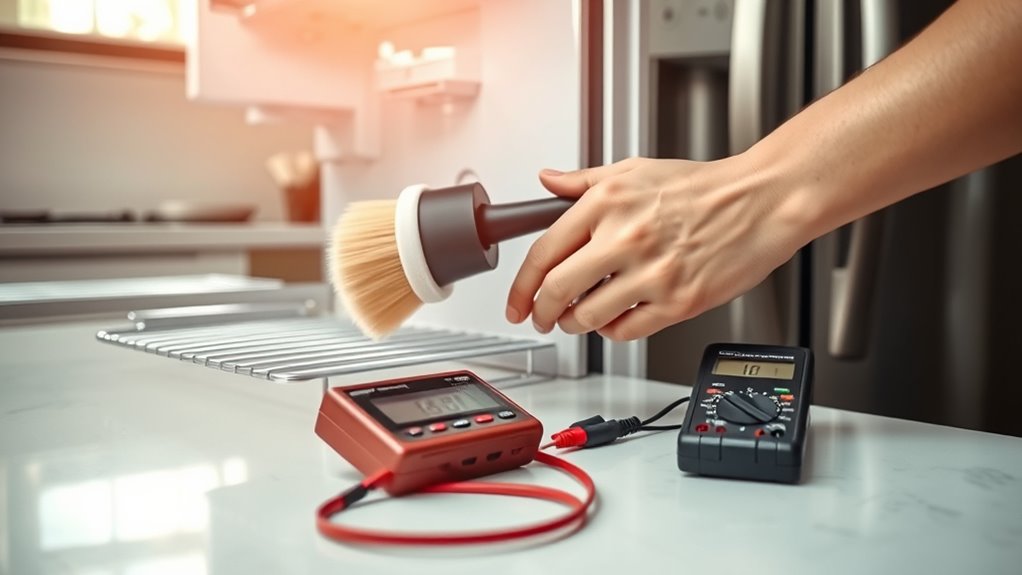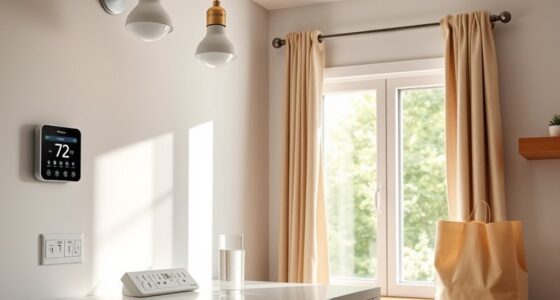To lower your energy use, regularly clean or replace filters, check for leaks around fridge doors and vents, and keep coils and fans free of dust. Seal any gaps and maintain proper airflow by clearing vents and exhausts. Tighten loose electrical connections and use timers or smart power strips to control energy drains. Routine maintenance on HVAC systems and appliances can boost efficiency—keep going to discover more simple tips to save energy and extend your appliances’ lifespan.
Key Takeaways
- Regularly clean or replace filters, coils, and fans to maintain optimal appliance efficiency.
- Seal leaks in doors, vents, and exhausts to prevent energy loss and improve performance.
- Descale appliances with vinegar or descalers to prevent mineral buildup that hampers efficiency.
- Manage power usage with timers, smart strips, and unplugging unused devices to reduce phantom loads.
- Schedule professional inspections for HVAC systems and perform routine maintenance to ensure efficient operation.
Clean and Replace Air Filters Regularly
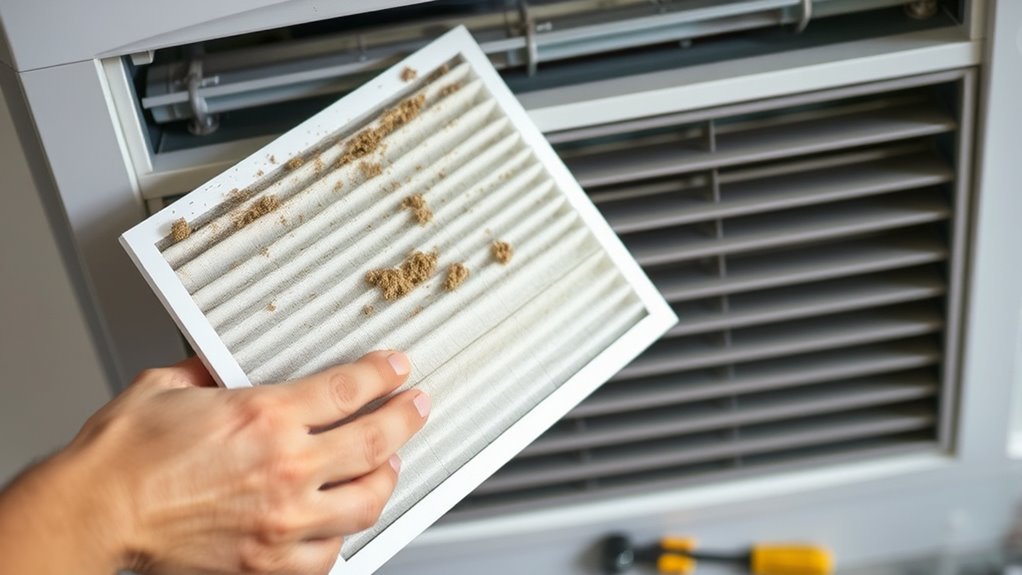
Regularly cleaning and replacing your air filters is essential to keep your appliances running efficiently. When filters are clogged with dust and debris, your HVAC system has to work harder to circulate air, increasing energy consumption. This added strain can also lead to system failure, resulting in costly repairs or replacements. This not only raises your utility bills but can also shorten the lifespan of your appliances. Check your filters monthly, especially during peak seasons, and replace or clean them as needed—usually every 1 to 3 months. Use high-quality filters suited to your system’s specifications for better airflow and filtration. Keeping filters clean prevents buildup that can cause overheating or malfunction. Simple maintenance like this guarantees your appliances operate smoothly, saving energy and extending their longevity. Regular filter care is a small step with significant benefits. Additionally, staying informed about automation in business can help you adopt more efficient home automation solutions in the future. Incorporating preventative maintenance routines can further optimize your appliance performance and energy savings over time. To maximize efficiency, consider also monitoring indoor air quality, which can indicate when filters need more frequent attention.
Check and Seal Leaks in Refrigerators and Freezers

Have you ever noticed your refrigerator or freezer running constantly or struggling to keep items cold? If so, you might have leaks or gaps letting cold air escape. Check around the door seals by closing the door on a dollar bill; if it slips out easily, the seal might be damaged. Examine the gasket for cracks, tears, or dirt buildup. Clean the seals with warm, soapy water to improve their grip. Also, inspect the perimeter for gaps where cold air could escape, especially behind the appliance. Seal small cracks with weatherstripping or silicone caulk. Proper sealing keeps cold air inside, reducing the compressor’s workload and lowering energy use. Regularly checking and sealing leaks helps your fridge or freezer run efficiently and saves you money. Being aware of energy-saving tips can further improve your appliance’s efficiency and reduce your utility bills. Additionally, considering Kia Tuning techniques, such as engine and suspension upgrades, can optimize your vehicle’s performance and efficiency. Incorporating lifestyle adjustments, like setting your thermostat to optimal temperatures, further enhances energy conservation. Also, using a leak detection method can help identify hidden gaps that may not be immediately visible.
Furthermore, understanding the role of refrigerator maintenance can extend the lifespan of your appliance and ensure optimal energy efficiency.
Maintain and Descale Your Dishwasher and Washing Machine
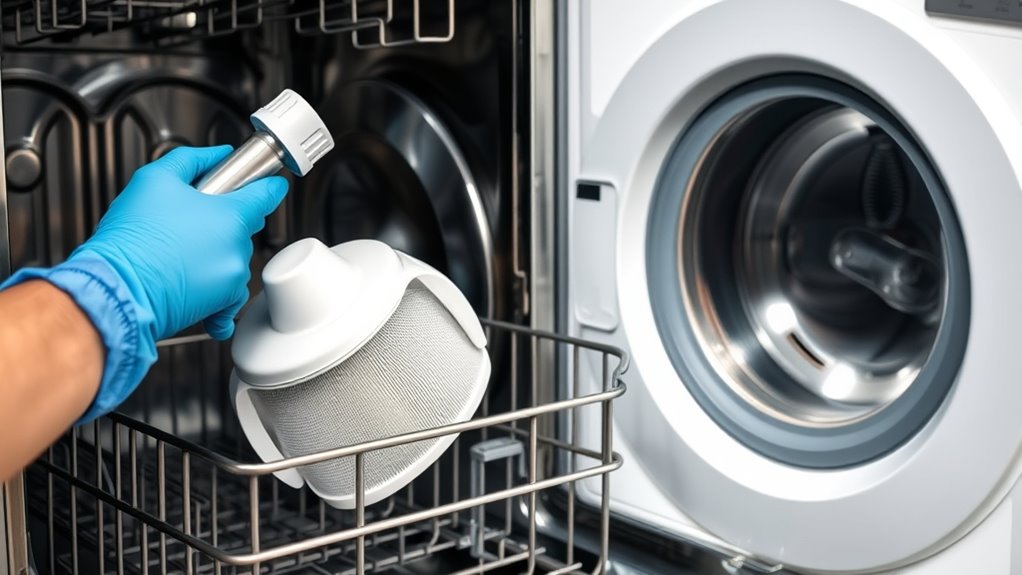
To keep your dishwasher and washing machine running smoothly, you need to stay on top of regular cleaning. Descaling techniques help remove mineral buildup that can hinder performance, and inspecting parts guarantees everything functions properly. Replacing worn or damaged components prevents breakdowns and extends the lifespan of your appliances. Being aware of appliance maintenance trends can also help you implement more effective care routines. Additionally, understanding the role of AI detection methods can assist in identifying issues early by analyzing performance patterns and alerting you to potential problems before they become serious. Incorporating advanced diagnostic tools can further improve maintenance accuracy and efficiency. Moreover, ensuring your appliances are compatible with modern heat pump systems can enhance overall efficiency and reduce energy consumption.
Regular Cleaning Practices
Did you know that performing regular cleaning and descaling can extend the life of your dishwasher and washing machine? Keeping these appliances clean prevents buildup of grime, soap scum, and mineral deposits, which can impair their efficiency. Regularly check and wipe down seals, gaskets, and filters to remove dirt and debris. Run an empty cycle with a specialized cleaner or white vinegar monthly to clear out residue. For your washing machine, clean the detergent drawer and lint filter weekly. Also, leave the door slightly open after use to prevent mold and mildew. Incorporating proper appliance maintenance techniques, such as checking hoses and connections regularly, can further enhance their performance and energy efficiency. Ensuring proper ventilation and airflow around appliances can help reduce overheating and improve energy use. Using self-cleaning features when available can help maintain optimal operation and reduce manual cleaning efforts. Additionally, understanding the importance of regular appliance maintenance can help prevent costly repairs and improve overall operation. These simple habits maintain ideal operation, reduce energy consumption, and avoid costly repairs. Consistent cleaning not only prolongs your appliances’ lifespan but also keeps them running efficiently.
Descaling Techniques Effectively
Over time, mineral deposits and soap scum can accumulate inside your dishwasher and washing machine, reducing their efficiency and lifespan. To descale effectively, run an empty cycle with a descaling agent like white vinegar or a commercial descaler. For vinegar, add two cups to the detergent compartment and run hot water. For stronger buildup, repeat the process weekly. You can also use baking soda by sprinkling it inside the drum and running a hot cycle. Regular descaling prevents clogs and improves appliance performance. Make descaling a routine, especially if you have hard water, and consider installing water softeners if mineral buildup persists. Avoid using harsh chemicals that could damage components. Proper descaling not only extends your appliance’s life but also saves energy by ensuring peak operation. Recognizing patterns in appliance behavior can serve as spiritual guidance, alerting you to potential issues early and maintaining your appliance’s optimal function.
Inspect and Replace Parts
Regularly inspecting your dishwasher and washing machine allows you to catch worn or damaged parts before they cause bigger problems. Check door seals, hoses, and filters for cracks, leaks, or buildup. Worn door seals can lead to water leaks and inefficient operation, so replace them if they’re cracked or torn. Inspect hoses for signs of wear, bulges, or leaks, and replace any damaged ones promptly. Clean or replace filters to ensure proper water flow and prevent clogs. Listen for unusual noises during operation, which may indicate loose or broken parts needing attention. Staying vigilant with these inspections helps your appliances run smoothly, lowers energy consumption, and extends their lifespan. Proper maintenance also helps maintain vacuum cleaner performance metrics, ensuring your appliances operate efficiently. Regular maintenance saves money and keeps your appliances performing at peak efficiency. Incorporating preventive maintenance strategies can further optimize appliance longevity and energy efficiency.
Clear Vents and Exhausts for Proper Airflow
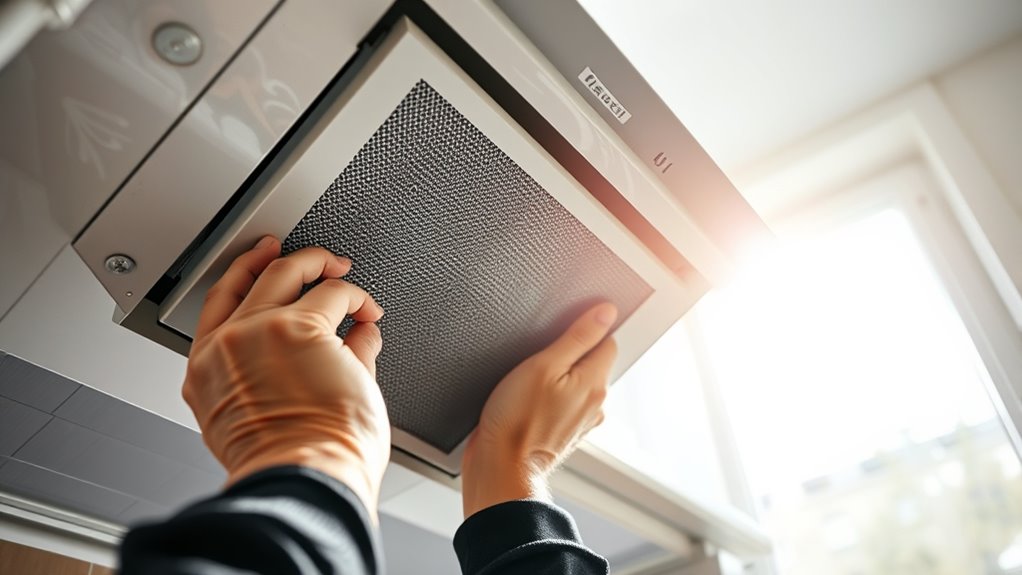
Ensuring your vents and exhausts are clear is essential for maintaining proper airflow in your appliances. When these pathways are blocked, your appliance has to work harder, using more energy and risking overheating. Regularly check for dust, dirt, or debris that may have accumulated. Clear obstructions to keep air moving smoothly. Imagine:
Keeping vents clear ensures efficient airflow, reduces energy use, and prevents appliance overheating.
- Dust and lint buildup clogging dryer vents, trapping heat inside
- Leaves or insects blocking outdoor exhaust vents, reducing airflow
- Grease or grease residue covering range hood vents, restricting air extraction
Keeping vents clean not only improves appliance efficiency but also extends its lifespan. Make it a routine to inspect and clear these pathways. A simple, proactive step can save energy and prevent costly repairs down the line.
Inspect and Tighten Loose Electrical Connections
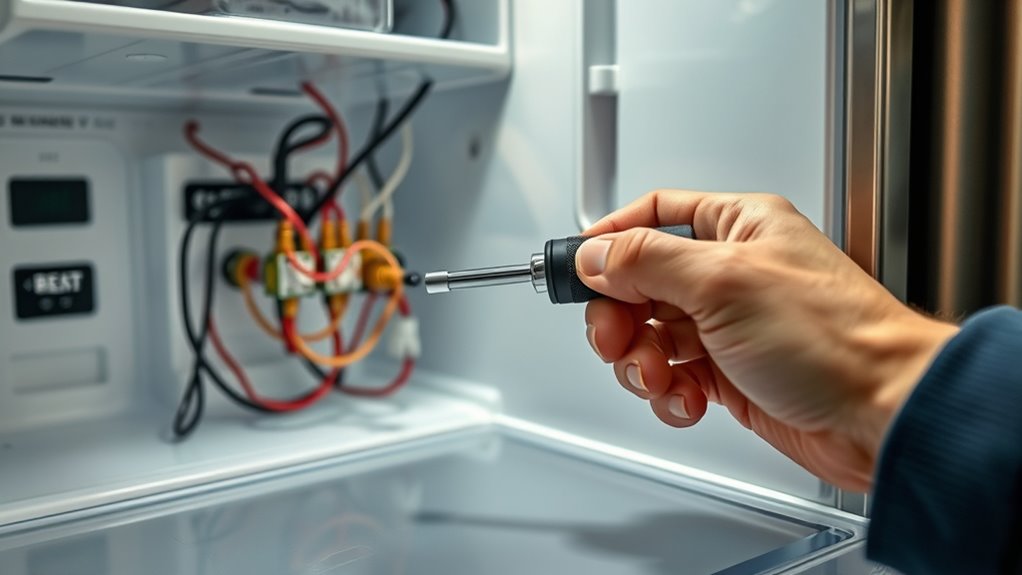
Loose electrical connections can cause appliances to malfunction or become unsafe. When connections aren’t secure, they can lead to electrical arcing, increased energy consumption, or even fires. To inspect, unplug the appliance first for safety. Look inside the control panel or accessible wiring areas for any loose, frayed, or disconnected wires. Gently tighten any loose screws or terminals with a screwdriver, ensuring all connections are snug. Avoid over-tightening, which can damage components. While inspecting, check for corrosion or burn marks that could indicate overheating. If you find damaged wires or connections, replace or repair them before using the appliance again. Regularly inspecting and tightening connections helps maintain efficiency, prevents potential hazards, and extends the lifespan of your appliances.
Use Appliance Timers and Smart Power Strips

Using appliance timers and smart power strips lets you automate power control easily, saving you time and effort. They also help cut down on phantom loads by turning off devices when not in use. This simple upgrade can substantially boost your energy efficiency at home.
Automate Power Control
Automating power control with appliance timers and smart power strips makes it easy to manage your devices efficiently. You can schedule when appliances turn on or off, preventing wasteful energy use during idle times. With smart strips, you can even control multiple devices from your phone, adjusting settings remotely. Imagine setting your coffee maker to brew just before you wake, or turning off your TV and chargers automatically at night. These tools help you avoid leaving devices on unintentionally, saving energy and reducing costs. Visualize your home running smoothly, with appliances working only when needed. Using timers and smart strips means less hassle and more control over your energy consumption, making your home smarter and more sustainable every day.
- Set your coffee maker to brew before you wake
- Automatically turn off idle chargers overnight
- Control multiple devices with a single app
Reduce Phantom Loads
Have you ever noticed how many devices draw power even when they’re turned off? This is called phantom load, and it can waste a surprising amount of energy. To cut down on this, use appliance timers or smart power strips. Plug devices like chargers, TVs, and computers into these strips, and set timers to turn them off when not in use. Smart power strips also detect when a device is in standby mode and cut power automatically. These simple tools prevent unnecessary energy drain, saving you money and reducing your carbon footprint. By actively managing power in this way, you make your home more energy-efficient. It’s an easy, cost-effective step that can have a big impact over time.
Schedule Routine Maintenance for HVAC Systems
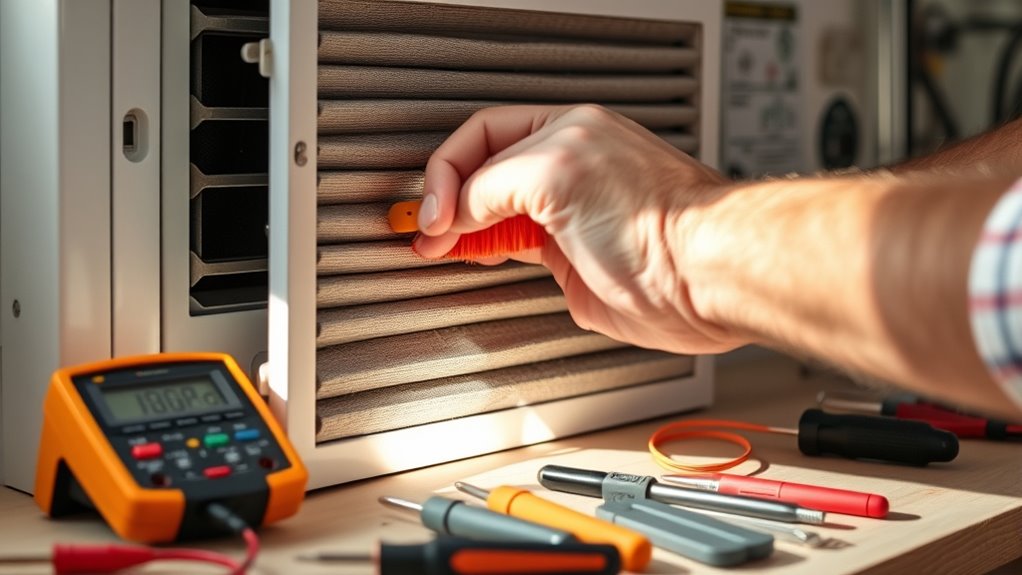
How often should you schedule routine maintenance for your HVAC system? Ideally, you should have a professional check it twice a year—once in spring and again in fall. Regular maintenance keeps your system running efficiently and prevents costly breakdowns. During these visits, technicians inspect and replace filters, check refrigerant levels, and test system controls. Imagine your HVAC technician:
- Drilling into the system, listening for unusual sounds
- Inspecting ducts for leaks and blockages
- Adjusting thermostats for peak performance
Scheduling these checkups ensures your system operates smoothly and uses less energy. It also extends the lifespan of your unit, saving you money in the long run. Staying consistent with maintenance is a simple step toward lower energy bills and a more comfortable home.
Keep Appliance Coils and Fans Clean
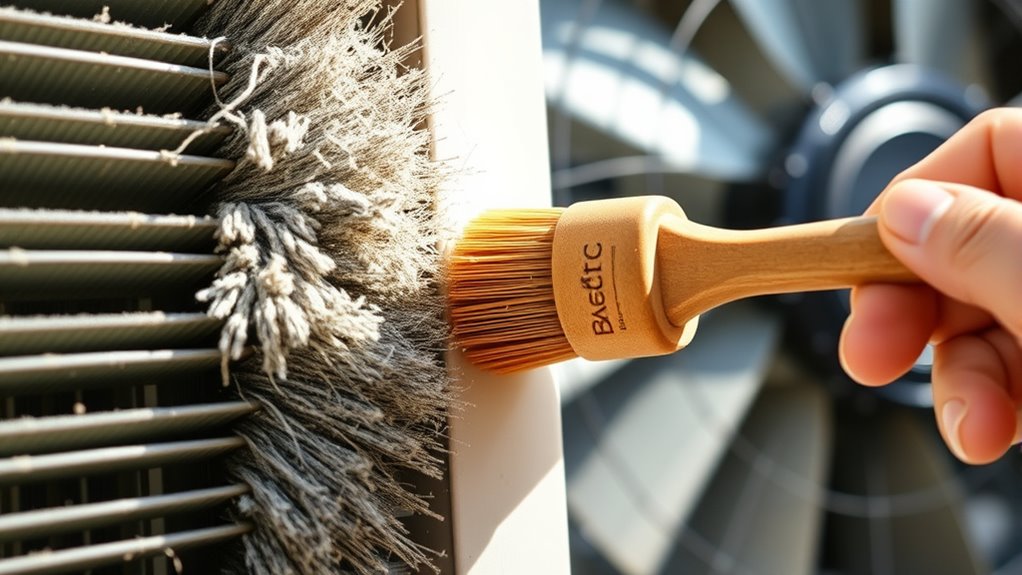
Keeping appliance coils and fans clean is essential for ideal performance and energy efficiency. Dirty coils and fans force your appliances to work harder, increasing energy consumption and wear. Regularly inspect and remove dust, dirt, and debris from evaporator and condenser coils, as well as fan blades. Use a soft brush or vacuum to gently clean these components. When coils are clogged, airflow decreases, and your system struggles to cool or heat effectively. Here’s a quick guide:
| Coil Type | Cleaning Method | Frequency |
|---|---|---|
| Evaporator Coil | Soft brush or vacuum | Every 6-12 months |
| Condenser Coil | Rinse with garden hose | Every 6-12 months |
| Fan Blades | Wipe with damp cloth | Monthly |
| Filter Fans | Replace or clean regularly | Monthly |
Frequently Asked Questions
How Often Should I Replace Air Filters for Optimal Energy Savings?
You should replace your air filters every 1 to 3 months to guarantee maximum energy savings. Regularly changing filters helps your HVAC system run more efficiently, reducing energy consumption and lowering your bills. If you have pets or allergies, consider changing filters more frequently. Keep an eye on the filter’s condition—if it looks dirty or clogged, swap it out sooner. Staying consistent with filter replacements keeps your system running smoothly.
What Signs Indicate Leaks in Refrigerators and Freezers?
You notice a strange, persistent smell or your fridge struggles to keep things cold—that’s a sign of leaks. You might also see frost buildup, water pooling, or hear unusual hissing sounds. These clues indicate refrigerant leaks or door seal issues. Catching leaks early can save energy and prevent costly repairs. Regularly inspecting seals and listening closely can help you catch problems before they worsen, keeping your appliance efficient.
How Can I Effectively Descale My Dishwasher and Washing Machine?
To effectively descale your dishwasher and washing machine, start by running an empty cycle with a descaling agent like white vinegar or a commercial descaler. For thorough cleaning, add a cup of vinegar to the drum or detergent dispenser and run a hot cycle. Regular descaling prevents buildup, keeps your appliances running efficiently, and saves energy. Remember to check your user manual for specific instructions and safety precautions.
What Is the Best Way to Clean Vents and Exhausts?
Cleaning vents and exhausts is essential for efficient operation. You should start by turning off the appliance and disconnecting it from power. Use a vacuum or a brush to remove dust and debris from the vents. For stubborn buildup, a damp cloth or mild detergent can help. Regularly check and clean these components to guarantee proper airflow, which improves energy efficiency and prolongs the lifespan of your appliances.
How Do I Identify Loose Electrical Connections in Appliances?
Think of loose electrical connections as silent troublemakers hiding in your appliances. To spot them, unplug the device first, then carefully open its panel. Look for frayed or disconnected wires, burn marks, or loose terminals that wobble. Gently tug on wires to check for looseness, but be cautious—if you’re unsure, call a professional. Addressing these issues keeps your appliances safe and running efficiently, saving energy and preventing costly repairs.
Conclusion
By performing these simple DIY maintenance tasks, you can cut your energy bills and extend your appliances’ lifespan. Did you know that poorly maintained appliances can waste up to 30% more energy? Regular care not only saves you money but also helps reduce your environmental impact. So, take a little time to check filters, seals, and vents—you’ll be surprised how much energy and money you can save while keeping everything running smoothly.
